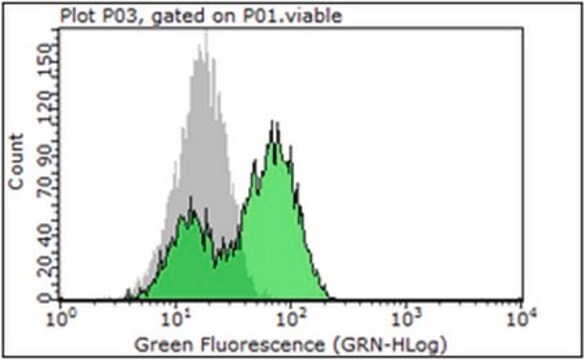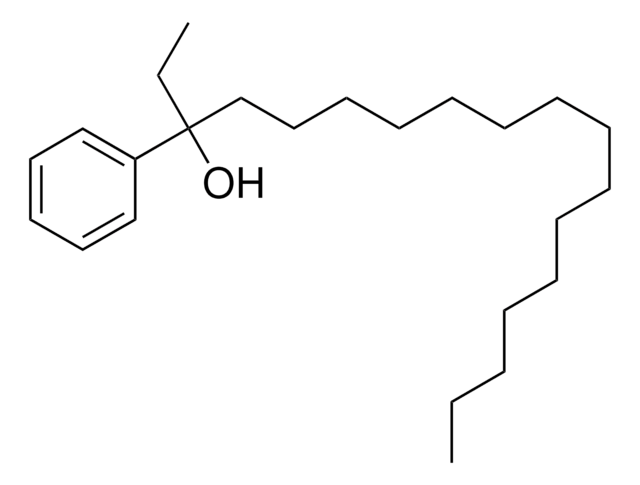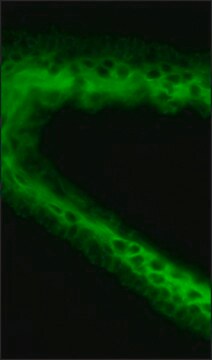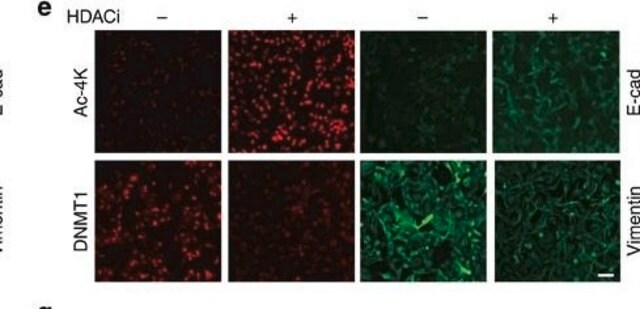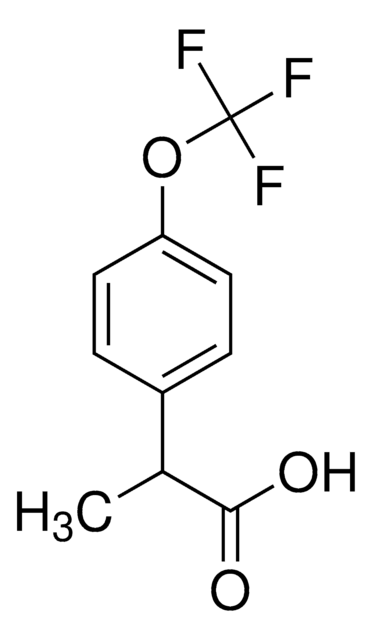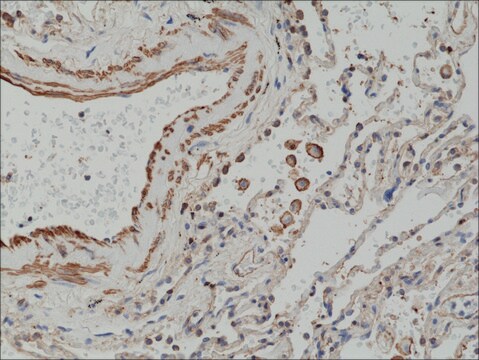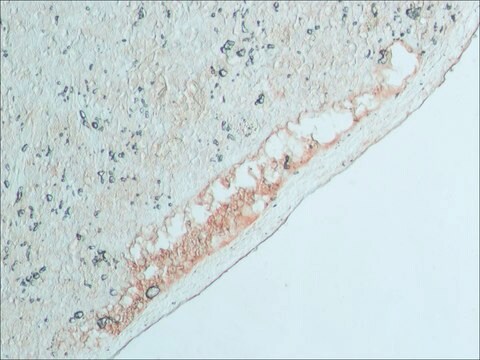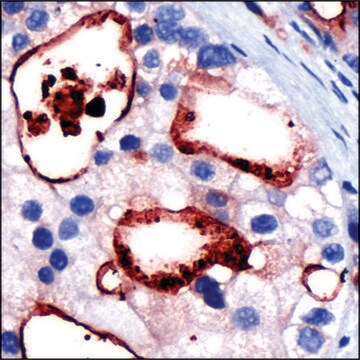MABS1320
Anti-Serpin B13 Antibody, clone B29
clone B29, from mouse
Sign Into View Organizational & Contract Pricing
All Photos(1)
About This Item
UNSPSC Code:
12352203
eCl@ss:
32160702
Recommended Products
biological source
mouse
Quality Level
antibody form
purified antibody
antibody product type
primary antibodies
clone
B29, monoclonal
species reactivity
human, mouse
packaging
antibody small pack of 25 μL
technique(s)
immunofluorescence: suitable
western blot: suitable
isotype
IgG2bκ
NCBI accession no.
UniProt accession no.
shipped in
ambient
target post-translational modification
unmodified
Gene Information
human ... SERPINB13(5275)
General description
Serpin B13 (UniProt: Q8CDC0) is encoded by the Serpinb13 gene (Gene ID: 241196) in murine species. Serpin B13 is a cytoplasmic protein that plays a role in the proliferation or differentiation of keratinocytes. Two isoforms of Serpin B13 have been described that are generated by alternative splicing. Serpin B13 acts as a serine proteinase inhibitor and studies have shown a strong induction of serpin B13 in the pancreas of mice during the first few weeks of life. Cathepsin L and K appear to be the targets of serpin B13 action. Serpin B13 is expressed in pancreas with low levels of expression in pancreatic islets and larger expression in the exocrine pancreas. Secretion of anti-serpin B13 autoantibodies in young diabetes-prone non-obese diabetic (NOD) mice is shown to be associated with reduced inflammation in pancreatic islets and a slower progression to autoimmune diabetes. Anti-serpin B13 autoantibodies are shown to protect NOD mice against diabetes before 16 weeks of age. Reduced expression of serpin B13 autoantibodies is associated with development of type I diabetes in human before 5 years of age. Mice injected with monoclonal anti-serpin B13 display few inflammatory cells in the islets and rapid recovery from recent onset diabetes.
Specificity
Clone B29 detects Serpin B13 in human and murine species.
Immunogen
Purified full length mouse Serpin B13 resuspended in Complete Freund′s Adjuvant.
Application
Anti-Serpin B13, clone B29, Cat. No. MABS1320, is a mouse monoclonal antibody that detects Serpin B13 and has been tested for use in Function Studies, Immunofluorescence, and Western Blotting.
Immunofluorescence Analysis: A representative lot detected Serpin B13 in Immunofluorescence applications (Baldzizhar, R., et. al. (2012). J Biol Chem. 288(3):1612-9).
Western Blotting Analysis: 3 ug/mL from a representative lot detected Serpin B13 in mouse serpin/HEK293 cell lysates (Courtesy of Dr. Jan Czyzyk, M.D., University of Rochester Medical Center, NY).
Western Blotting Analysis: A representative lot detected Serpin B13 in Western Blotting applications (Baldzizhar, R., et. al. (2012). J Biol Chem. 288(3):1612-9; Czyzyk, J., et. al. (2012). J Immunol. 188(12):6319-27).
Affects Function Analysis: A representative lot detected Serpin B13 in Affects Function applications (Baldzizhar, R., et. al. (2012). J Biol Chem. 288(3):1612-9).
Western Blotting Analysis: 3 ug/mL from a representative lot detected Serpin B13 in mouse serpin/HEK293 cell lysates (Courtesy of Dr. Jan Czyzyk, M.D., University of Rochester Medical Center, NY).
Western Blotting Analysis: A representative lot detected Serpin B13 in Western Blotting applications (Baldzizhar, R., et. al. (2012). J Biol Chem. 288(3):1612-9; Czyzyk, J., et. al. (2012). J Immunol. 188(12):6319-27).
Affects Function Analysis: A representative lot detected Serpin B13 in Affects Function applications (Baldzizhar, R., et. al. (2012). J Biol Chem. 288(3):1612-9).
Research Category
Signaling
Signaling
Quality
Isotype testing: Identity Confirmation by Isotyping Test.
Isotyping Analysis: The identity of this monoclonal antibody is confirmed by isotyping test to be mouse IgG1 .
Isotyping Analysis: The identity of this monoclonal antibody is confirmed by isotyping test to be mouse IgG1 .
Target description
44.32 kda calculated.
Physical form
Format: Purified
Protein G purified
Purified mouse monoclonal antibody IgG2b in buffer containing 0.1 M Tris-Glycine (pH 7.4), 150 mM NaCl with 0.05% sodium azide.
Storage and Stability
Stable for 1 year at 2-8°C from date of receipt.
Other Notes
Concentration: Please refer to lot specific datasheet.
Disclaimer
Unless otherwise stated in our catalog or other company documentation accompanying the product(s), our products are intended for research use only and are not to be used for any other purpose, which includes but is not limited to, unauthorized commercial uses, in vitro diagnostic uses, ex vivo or in vivo therapeutic uses or any type of consumption or application to humans or animals.
Not finding the right product?
Try our Product Selector Tool.
Certificates of Analysis (COA)
Search for Certificates of Analysis (COA) by entering the products Lot/Batch Number. Lot and Batch Numbers can be found on a product’s label following the words ‘Lot’ or ‘Batch’.
Already Own This Product?
Find documentation for the products that you have recently purchased in the Document Library.
Our team of scientists has experience in all areas of research including Life Science, Material Science, Chemical Synthesis, Chromatography, Analytical and many others.
Contact Technical Service